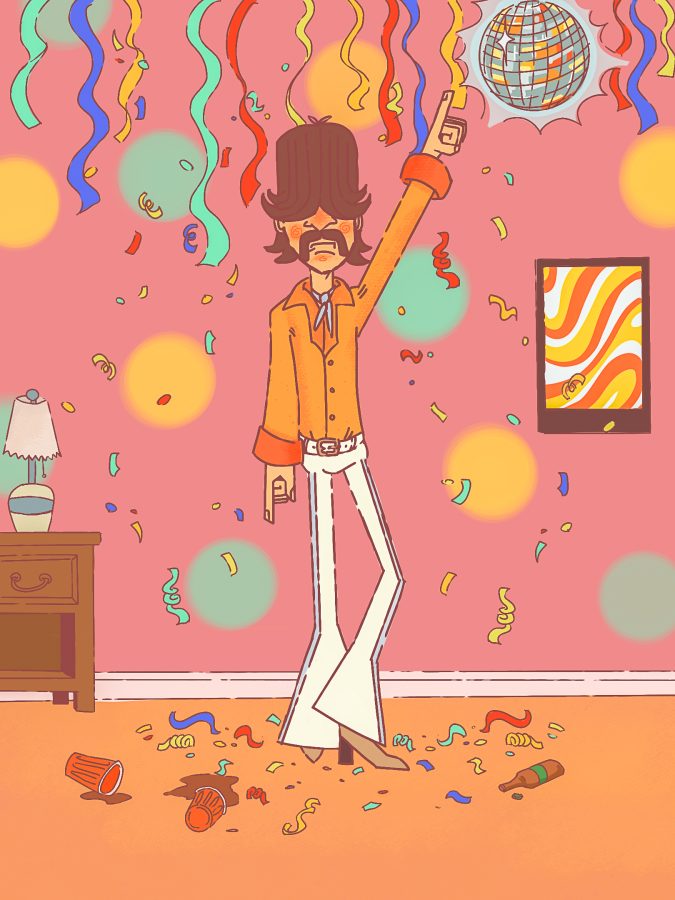The Bee Gees once said, “you should be dancing—yeah!” As it turns out, UMass Boston agrees. The university will soon be opening its first nightclub, specifically in the form of a disco. Why would anyone in their right mind do this? Well, they wouldn’t, but UMass Boston did.
Didn’t disco die forty years ago? Isn’t this a school “for the times?” If you find yourself asking those questions you clearly haven’t been at UMass Boston long enough. When we say we’re for the times, it’s less about being progressive and more about shutting people up. They just won’t stop whining, will they? So, maybe it’s time for a different kind of distraction.
“Look, it’s no secret that times are tough, and we need every cent we can get. There are so many economic…problems,” says Barry Blevins, a professor of economics who was heavily involved in the disco decision. “You know inflation? It’s bad.”
Blevins pleaded with higher-ups for months before finally getting a yes—sort of. “I was hoping they’d make a new building or at least use a nicer one. Disco is all about that glitz and glamor, you know. You want to walk into a maelstrom of light and color. Instead, we got Wheatley.”
Using the few dollars it could spare, the university “renovated” the basement of Wheatley, making it look reminiscent of the great discotheques of the past. Bobby Beacon, the infamous mascot of said university, took issue with this. “It’s my boneyard, man! I don’t want you guys digging around there,” he said in his usual manic manner. “It’s not that I’m against disco. Believe me, I’m no stranger to the boogie. I just don’t want that kind of scene in my house. I went to Studio 54 back in the seventies, and while I had the time of my life with some great people, there’s no way I’d let a single one of them get their grimy paws on my pinball machine. It just ain’t happening!” However, Blevins got him to reconsider.
“This isn’t some dirty nightclub where you get harassed or mugged. Disco is something greater—it’s classy. You dress up to get down. What we’re providing here is a weekend getaway from the Beacon blues of Monday through Thursday. Under that disco ball, it’s always Friday, Saturday, Sunday or a day off. I don’t know, whatever rocks your boat.”
This isn’t the first time UMass Boston has had a musical gathering. Famously, Stevie Wonder came to campus in 1974 and performed some of his songs. That was a high point for this university. Unfortunately, high points are somewhat rare for our school.
“I’m not going to lie. We’ve never been the best at…things.” I was speaking to Nancy Steinfeld, a security guard for past university events. “We’ve had musicians other than Stevie come on campus before. In the sixties, there were some British Invasion rejects, like ‘Gertrum’s Yum Yums’ and ‘Sammy and the Wammies.’ I think there was a massive riot or something when ‘The Bees Neez’ played. The seventies brought funk bands like ‘Laser Cat Scratchers’ and the eighties brought New Wave wannabes like ‘The Quiet Screamers.’ At best, no one shows up to those shows…at best.”
Hearing that, it’s no surprise that very little was put into preparing the disco for its big opening. Professor Blevins was very upset about this and even tried raising the money himself. “I opened up a lemonade stand over on Morrissey Boulevard. Nobody showed up. Can you believe it? I kind of feel like somebody sabotaged me but I ain’t acting ‘till I got proper proof.”
Finally, the grand opening came…and went. While a few students showed up, they probably regretted it immediately. The speakers were blaring seventies disco hits, but they were also aggressively feedbacking every other second. Every time somebody tried to start dancing, Bobby Beacon would desperately attempt to one-up them by storming onto the floor. While beverages were served, they tasted suspiciously of sweat. “What can I say, I was nervous,” said Professor Blevins.
The glitz and glamor just weren’t there, and the disco was an economic disaster. As a result of this disco inferno, there are multiple lawsuits against Bobby Beacon for tackling dancers. Money that could have been invested elsewhere has now been horribly wasted and disco has been proven dead. Despite this, Professor Blevins wants us to focus on what succeeded. “I got to whip out my old disco duds,” he said, showing me his John Travolta-esque white suit and black dress shoes. “They’ve just been sitting in my closet for decades.” Judging by the smell, I don’t think he was lying.

